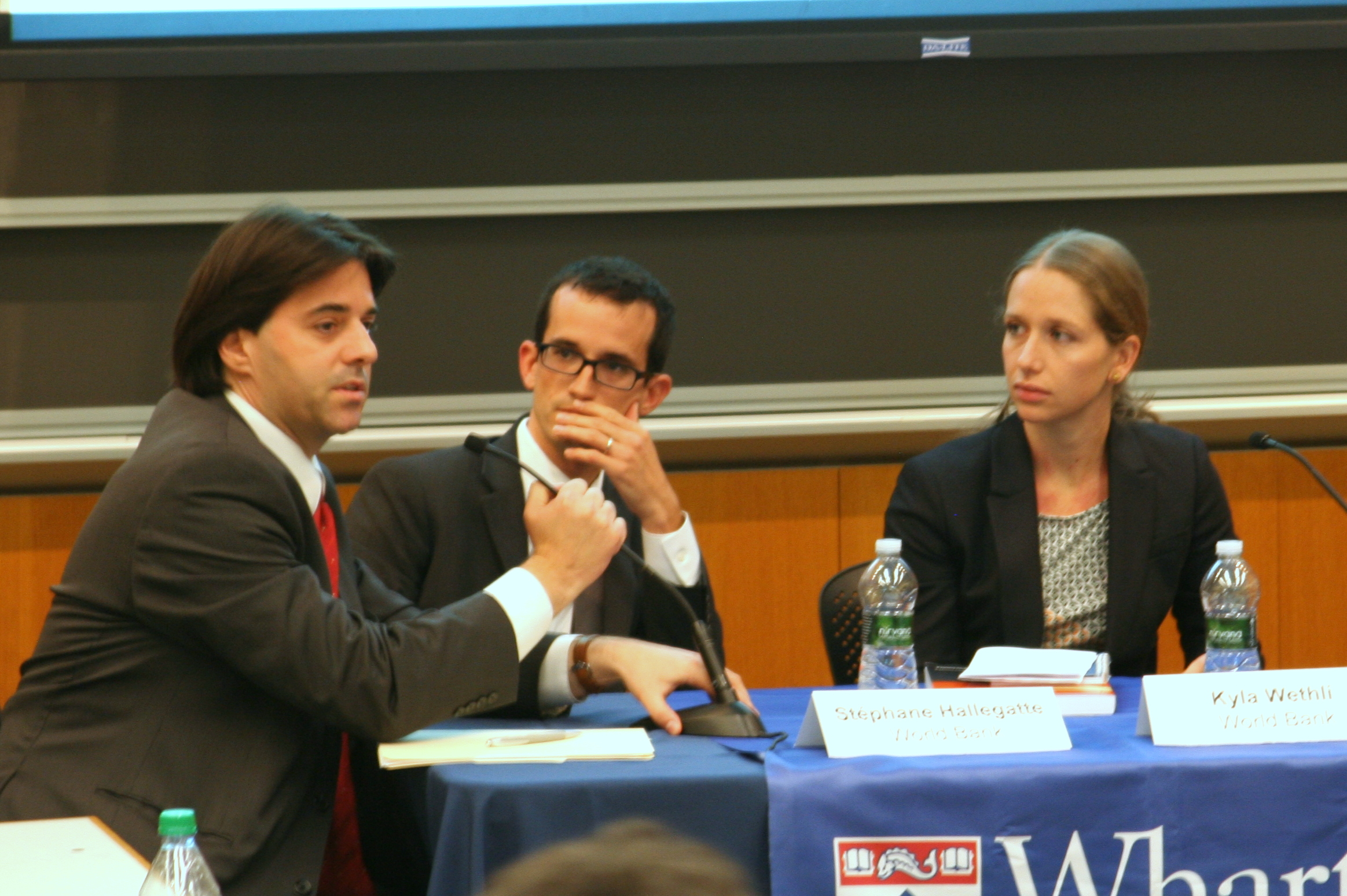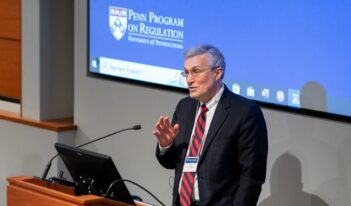
Authors of World Bank report advocate move from ‘crisis fighting’ to systematic risk management.
Despite progress in reducing poverty around the world, the poor in developing countries remain vulnerable to economic and natural crises. Today, more than seventy-five percent of the population in developing countries still lives on less than $4.00 a day, according to World Bank data.
The World Development Report 2014, recently issued by the World Bank, argues that governments in developing countries need to engage in more proactive and systematic risk management in order to build a more solid foundation for economic growth.

Erwann Michel-Kerjan (Wharton Risk Center), Stéphane Hallegatte (World Bank), Kyla Wethli (World Bank), Norman Loayza (World Bank)
“Mounting evidence shows that adverse shocks—above all, health and weather shocks and economic crises—play a major role in pushing households below the poverty line and keeping them there,” according to the report, titled “Risk and Opportunity: Managing Risk for Development.”
Its authors recently presented their findings at the University of Pennsylvania, as part of the Penn Program of Regulation’s (PPR) Risk Regulation Seminar Series. They argued that effective risk management, at each level of society, can be a powerful tool for development and may “help people build better, more secure futures.”
The World Bank team that produced the report, led by World Development Report Director Norman Loayza, argued that preparation and recovery efforts by governments, communities, and individuals have become more essential in the face of social unrest, economic crises, and more frequent environmental disasters. Effective risk management practices can “provide both resilience to withstand future events and the ability to take advantage of development opportunities.”
According to the report, adverse shocks play a major role in pushing households below the poverty line and keeping them there. Over the past twenty-five years, the world has been transformed by “rapid integration, economic reform, technological modernization, and increased democratic participation, but has also endured financial turbulence, job and income loss, and environmental damage.” Rather than rejecting change to avoid risk, the World Development Report 2014 contends that people and institutions must prepare for the opportunities and risks that accompany change.

Prof. Cary Coglianese; Director, Penn Program on Regulation
The benefits of preparing and managing risk will usually outweigh the costs, sometimes overwhelmingly so, the report’s authors argued. For example, mineral supplements designed to prevent malnutrition can yield benefits fifteen times greater than the costs.
Bangladesh, a country that has faced three devastating cyclones in the past four decades, provides another example. Due to the implementation of a nationwide program to build shelters, improve forecasting capacity, and extend a simple public alert system, the casualties from cyclones in Bangladesh have been greatly reduced—from 300,000 lives lost in 1970 to 4,000 in 2007.
Even when risk preparation is cost-effective and saves lives, many individuals and societies remain ill-equipped to respond to shocks. Constraints and obstacles posed by a lack of information and resources, cognitive and behavior failures, missing markets and public goods, and unintended social and economic consequences make risk a “special challenge” for development policy. Because individuals have limited capacity to respond to shocks , a supportive environment is needed for effective preparation and response to risk.
“We’re advocating a sea change in the way risk is managed,” said the World Bank Group President Jim Yong Kim in announcing the recent report. “Our new approach calls for individuals and institutions to shift from being ‘crisis fighters’ to proactive and systematic risk managers.”
The World Bank urges a holistic approach to managing risk. It calls for “shared action and responsibility at different levels of society, from the household to the international community.”

Prof. Erwann Michel-Kerjan; Executive Director, Wharton Risk Center
The speakers at the recent Penn seminar discussed possible ways that each level of society might contribute to improved risk management. While households remain the primary source of support, governments have a “critical role in managing systemic risks, providing an enabling environment for shared action and responsibility, and channeling direct support to vulnerable people.” On the broader level, the international community can offer expertise and pool global resources.
The report’s authors stressed that risk can never be completely eliminated. But people and institutions can build resilience to risk by “applying a balanced approach that includes structural policy measures, community-based prevention, insurance, education, training, and effective regulation.” The report recommends countries set up national risk boards to “systematically assess risks and coordinate public and private actions to address them.”
In addition to lessening the uncertainty and impact of risks, governments must also provide the right incentives to people and institutions to do their own planning and preparation. According to Director Norman Loayza, “To manage risks effectively, two changes in people’s mindset related to individual and social responsibility are critical: moving from dependency to self-reliance and from isolation to cooperation. Providing the right incentives can contribute in both regards.”
The Risk Regulation Seminar Series is jointly sponsored by the Penn Program on Regulation, the Wharton Risk Management & Decision Processes Center, and the University of Pennsylvania’s Initiative for Global Environmental Leadership. The seminar on the World Bank report was moderated by Erwann Michel-Kerjan, the Managing Director of the Wharton Risk Center, and a video of the session can be viewed at the Center’s website.



